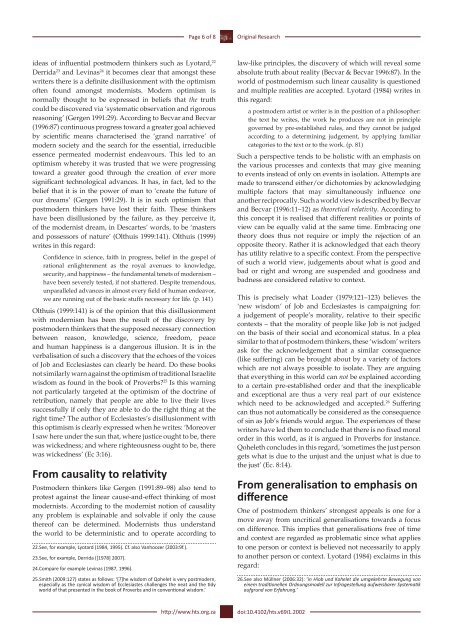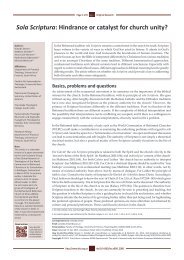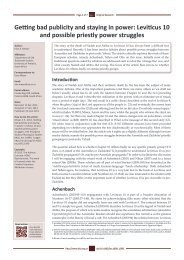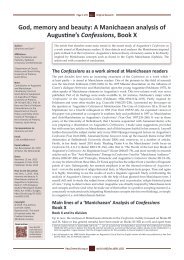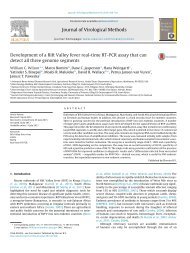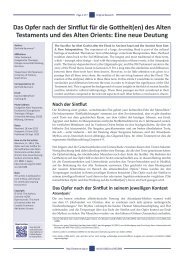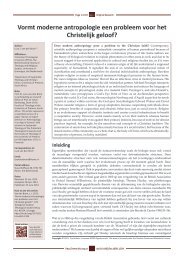Job and Ecclesiastes as (postmodern?) - HTS Teologiese Studies ...
Job and Ecclesiastes as (postmodern?) - HTS Teologiese Studies ...
Job and Ecclesiastes as (postmodern?) - HTS Teologiese Studies ...
Create successful ePaper yourself
Turn your PDF publications into a flip-book with our unique Google optimized e-Paper software.
Page 6 of 8<br />
Original Research<br />
ide<strong>as</strong> of influential <strong>postmodern</strong> thinkers such <strong>as</strong> Lyotard, 22<br />
Derrida 23 <strong>and</strong> Levin<strong>as</strong> 24 it becomes clear that amongst these<br />
writers there is a definite disillusionment with the optimism<br />
often found amongst modernists. Modern optimism is<br />
normally thought to be expressed in beliefs that the truth<br />
could be discovered via ‘systematic observation <strong>and</strong> rigorous<br />
re<strong>as</strong>oning’ (Gergen 1991:29). According to Becvar <strong>and</strong> Becvar<br />
(1996:87) continuous progress toward a greater goal achieved<br />
by scientific means characterised the ‘gr<strong>and</strong> narrative’ of<br />
modern society <strong>and</strong> the search for the essential, irreducible<br />
essence permeated modernist endeavours. This led to an<br />
optimism whereby it w<strong>as</strong> trusted that we were progressing<br />
toward a greater good through the creation of ever more<br />
significant technological advances. It h<strong>as</strong>, in fact, led to the<br />
belief that it is in the power of man to ‘create the future of<br />
our dreams’ (Gergen 1991:29). It is in such optimism that<br />
<strong>postmodern</strong> thinkers have lost their faith. These thinkers<br />
have been disillusioned by the failure, <strong>as</strong> they perceive it,<br />
of the modernist dream, in Descartes’ words, to be ‘m<strong>as</strong>ters<br />
<strong>and</strong> possessors of nature’ (Olthuis 1999:141). Olthuis (1999)<br />
writes in this regard:<br />
Confidence in science, faith in progress, belief in the gospel of<br />
rational enlightenment <strong>as</strong> the royal avenues to knowledge,<br />
security, <strong>and</strong> happiness – the fundamental tenets of modernism –<br />
have been severely tested, if not shattered. Despite tremendous,<br />
unparalleled advances in almost every field of human endeavor,<br />
we are running out of the b<strong>as</strong>ic stuffs necessary for life. (p. 141)<br />
Olthuis (1999:141) is of the opinion that this disillusionment<br />
with modernism h<strong>as</strong> been the result of the discovery by<br />
<strong>postmodern</strong> thinkers that the supposed necessary connection<br />
between re<strong>as</strong>on, knowledge, science, freedom, peace<br />
<strong>and</strong> human happiness is a dangerous illusion. It is in the<br />
verbalisation of such a discovery that the echoes of the voices<br />
of <strong>Job</strong> <strong>and</strong> <strong>Ecclesi<strong>as</strong>tes</strong> can clearly be heard. Do these books<br />
not similarly warn against the optimism of traditional Israelite<br />
wisdom <strong>as</strong> found in the book of Proverbs? 25 Is this warning<br />
not particularly targeted at the optimism of the doctrine of<br />
retribution, namely that people are able to live their lives<br />
successfully if only they are able to do the right thing at the<br />
right time? The author of <strong>Ecclesi<strong>as</strong>tes</strong>’s disillusionment with<br />
this optimism is clearly expressed when he writes: ‘Moreover<br />
I saw here under the sun that, where justice ought to be, there<br />
w<strong>as</strong> wickedness; <strong>and</strong> where righteousness ought to be, there<br />
w<strong>as</strong> wickedness’ (Ec 3:16).<br />
From causality to relativity<br />
Postmodern thinkers like Gergen (1991:89–98) also tend to<br />
protest against the linear cause-<strong>and</strong>-effect thinking of most<br />
modernists. According to the modernist notion of causality<br />
any problem is explainable <strong>and</strong> solvable if only the cause<br />
thereof can be determined. Modernists thus underst<strong>and</strong><br />
the world to be deterministic <strong>and</strong> to operate according to<br />
22.See, for example, Lyotard (1984, 1995). Cf. also Vanhoozer (2003:9f.).<br />
23.See, for example, Derrida ([1978] 2007).<br />
24.Compare for example Levin<strong>as</strong> (1987, 1996).<br />
25.Smith (2009:127) states <strong>as</strong> follows: ‘[T]he wisdom of Qohelet is very <strong>postmodern</strong>,<br />
especially <strong>as</strong> the cynical wisdom of <strong>Ecclesi<strong>as</strong>tes</strong> challenges the neat <strong>and</strong> the tidy<br />
world of that presented in the book of Proverbs <strong>and</strong> in conventional wisdom.’<br />
law-like principles, the discovery of which will reveal some<br />
absolute truth about reality (Becvar & Becvar 1996:87). In the<br />
world of <strong>postmodern</strong>ism such linear causality is questioned<br />
<strong>and</strong> multiple realities are accepted. Lyotard (1984) writes in<br />
this regard:<br />
a <strong>postmodern</strong> artist or writer is in the position of a philosopher:<br />
the text he writes, the work he produces are not in principle<br />
governed by pre-established rules, <strong>and</strong> they cannot be judged<br />
according to a determining judgement, by applying familiar<br />
categories to the text or to the work. (p. 81)<br />
Such a perspective tends to be holistic with an emph<strong>as</strong>is on<br />
the various processes <strong>and</strong> contexts that may give meaning<br />
to events instead of only on events in isolation. Attempts are<br />
made to transcend either/or dichotomies by acknowledging<br />
multiple factors that may simultaneously influence one<br />
another reciprocally. Such a world view is described by Becvar<br />
<strong>and</strong> Becvar (1996:11–12) <strong>as</strong> theoretical relativity. According to<br />
this concept it is realised that different realities or points of<br />
view can be equally valid at the same time. Embracing one<br />
theory does thus not require or imply the rejection of an<br />
opposite theory. Rather it is acknowledged that each theory<br />
h<strong>as</strong> utility relative to a specific context. From the perspective<br />
of such a world view, judgements about what is good <strong>and</strong><br />
bad or right <strong>and</strong> wrong are suspended <strong>and</strong> goodness <strong>and</strong><br />
badness are considered relative to context.<br />
This is precisely what Loader (1979:121–123) believes the<br />
‘new wisdom’ of <strong>Job</strong> <strong>and</strong> <strong>Ecclesi<strong>as</strong>tes</strong> is campaigning for:<br />
a judgement of people’s morality, relative to their specific<br />
contexts – that the morality of people like <strong>Job</strong> is not judged<br />
on the b<strong>as</strong>is of their social <strong>and</strong> economical status. In a plea<br />
similar to that of <strong>postmodern</strong> thinkers, these ‘wisdom’ writers<br />
<strong>as</strong>k for the acknowledgement that a similar consequence<br />
(like suffering) can be brought about by a variety of factors<br />
which are not always possible to isolate. They are arguing<br />
that everything in this world can not be explained according<br />
to a certain pre-established order <strong>and</strong> that the inexplicable<br />
<strong>and</strong> exceptional are thus a very real part of our existence<br />
which need to be acknowledged <strong>and</strong> accepted. 26 Suffering<br />
can thus not automatically be considered <strong>as</strong> the consequence<br />
of sin <strong>as</strong> <strong>Job</strong>’s friends would argue. The experiences of these<br />
writers have led them to conclude that there is no fixed moral<br />
order in this world, <strong>as</strong> it is argued in Proverbs for instance.<br />
Qoheleth concludes in this regard, ‘sometimes the just person<br />
gets what is due to the unjust <strong>and</strong> the unjust what is due to<br />
the just’ (Ec. 8:14).<br />
From generalisation to emph<strong>as</strong>is on<br />
difference<br />
One of <strong>postmodern</strong> thinkers’ strongest appeals is one for a<br />
move away from uncritical generalisations towards a focus<br />
on difference. This implies that generalisations free of time<br />
<strong>and</strong> context are regarded <strong>as</strong> problematic since what applies<br />
to one person or context is believed not necessarily to apply<br />
to another person or context. Lyotard (1984) exclaims in this<br />
regard:<br />
26.See also Müllner (2006:32): ‘in Hiob und Kohelet die umgekehrte Bewegung von<br />
einem traditionellen Ordnungsmodell zur Infragestellung aufweisbarer Systematik<br />
aufgrund von Erfahrung.’<br />
http://www.hts.org.za<br />
doi:10.4102/hts.v69i1.2002


